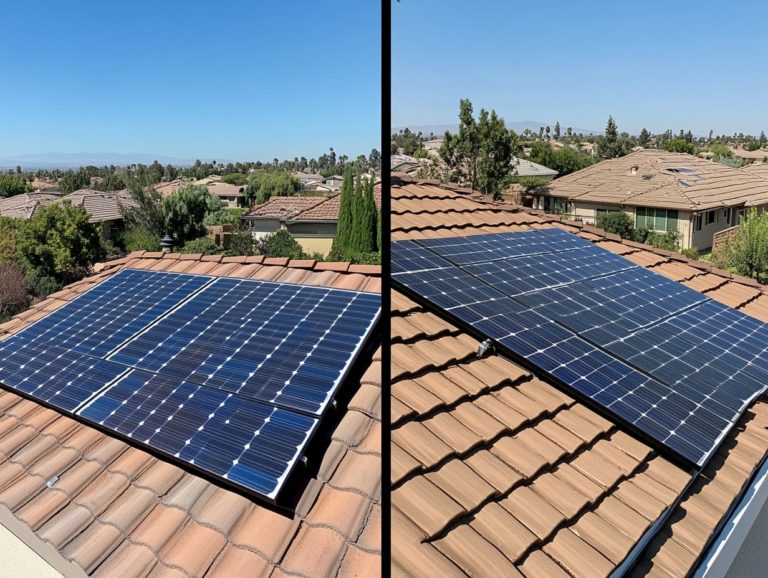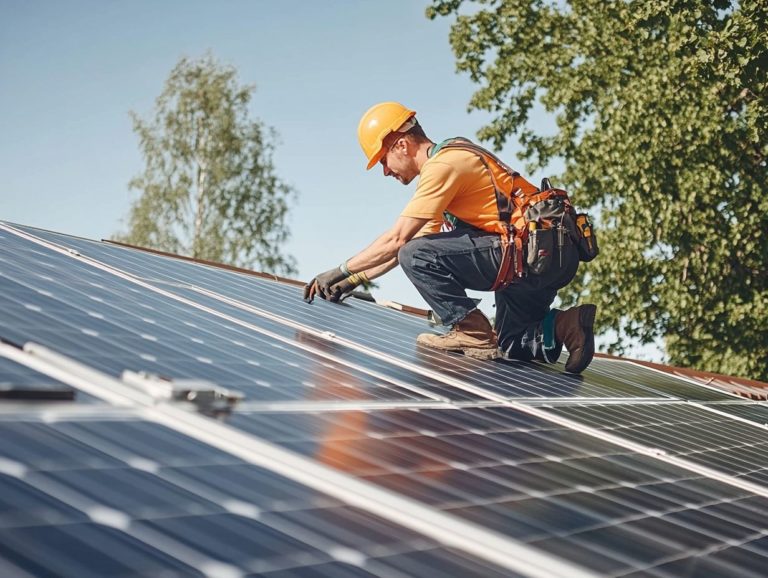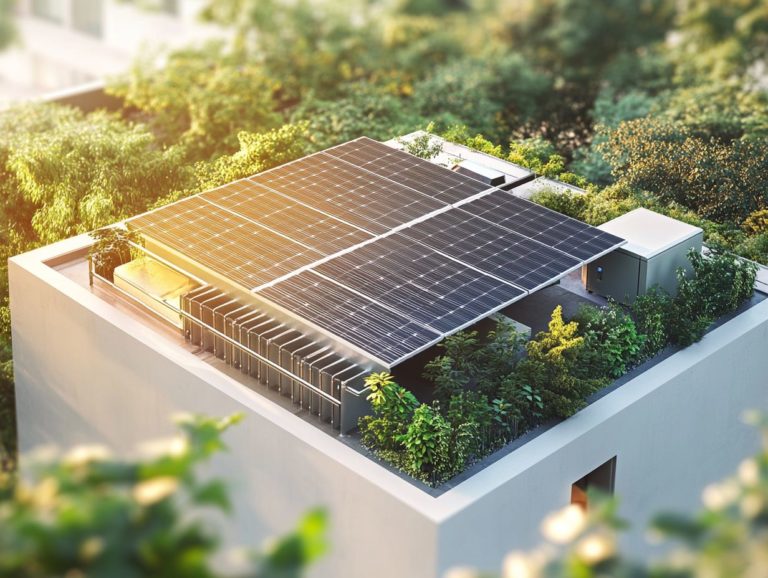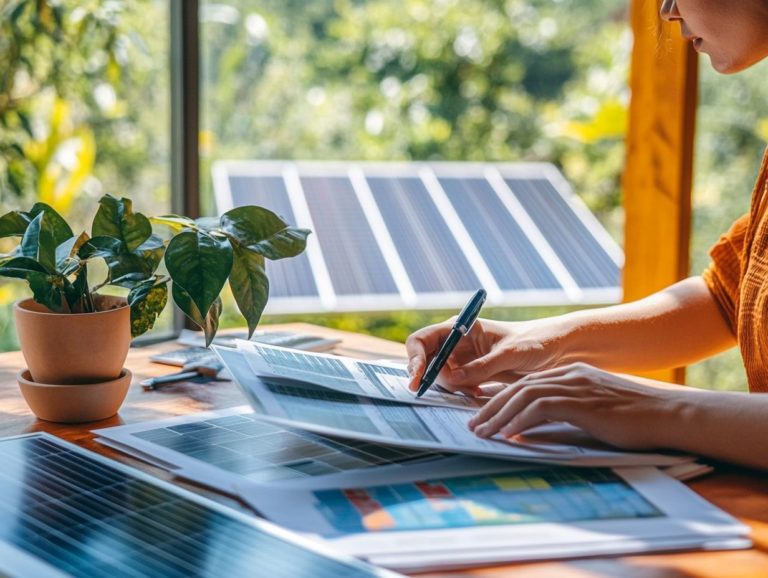“How to Prepare Your Home for Solar Installation”
Considering a switch to solar energy? You re certainly in good company! More homeowners are pursuing sustainable energy solutions, making it essential to understand the intricacies of solar installation.
This article explores what solar installation involves, the environmental and financial benefits, and key factors to evaluate if your home is suitable for solar.
From necessary preparation steps to selecting the right solar company, and understanding the installation and maintenance process, you will uncover all the insights you need.
Get ready to transform your energy future with solar power!
Contents
- Key Takeaways:
- Benefits of Switching to Solar Energy
- Assessing Your Home’s Suitability for Solar
- Preparing Your Home for Solar Installation
- Choosing the Right Solar Company
- Installation Process and Timeline
- Maintaining Your Solar System
- Frequently Asked Questions
- Can I install solar panels on my home?
- Do I need to prepare my home for solar installation?
- Do I need to obtain any permits for solar installation?
- How long does it take to prepare my home for solar installation?
- What should I do with my trees or landscaping before solar installation?
- Do I need to be home during solar installation?
Key Takeaways:
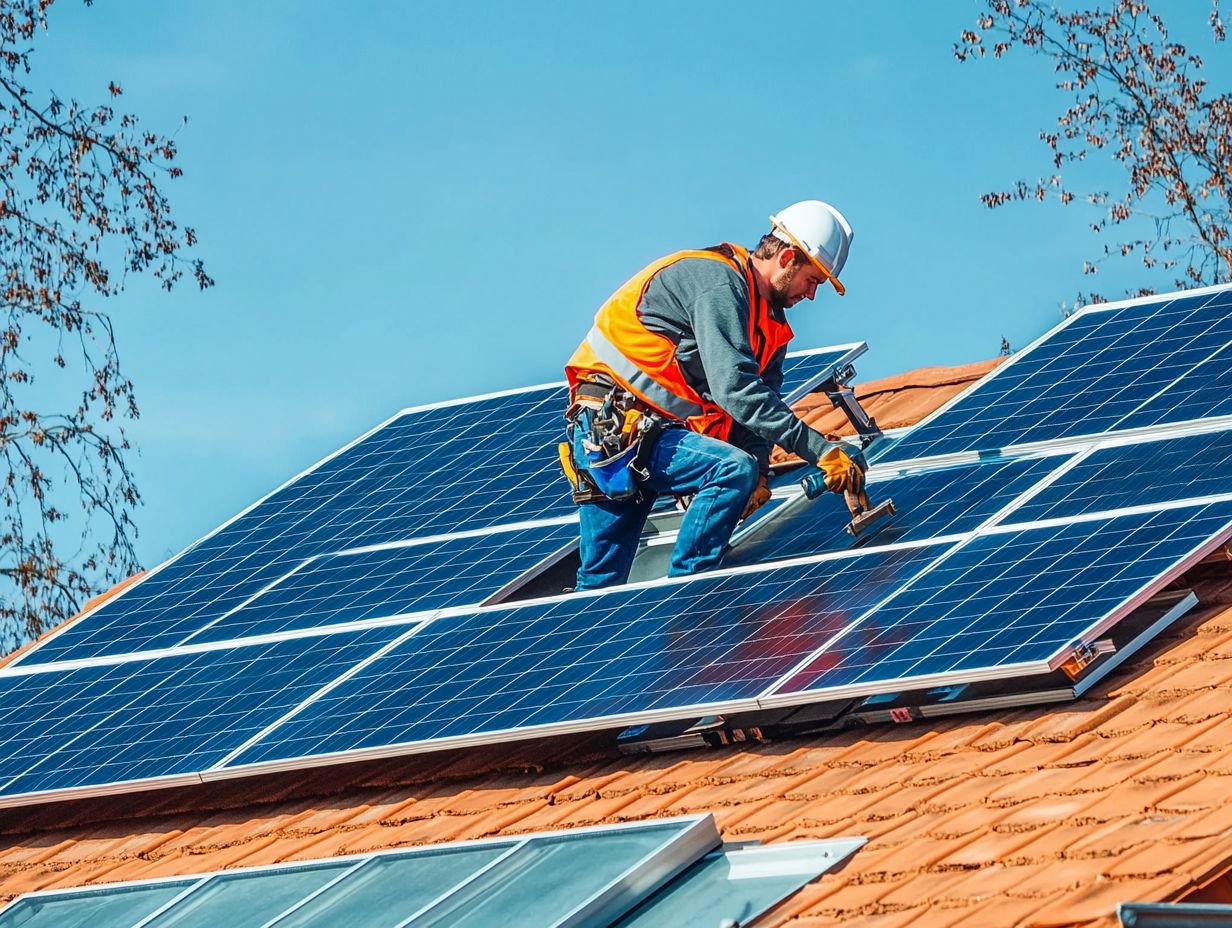
- Switching to solar energy offers both environmental and financial benefits.
- Before installation, assess your home’s suitability for solar.
- Choose a reputable solar company and maintain your system for long-lasting use.
What is Solar Installation?
Solar installation involves setting up solar panels and necessary equipment to harness solar energy for your home or business. This process includes components like solar panels, devices that change solar energy into usable electricity, and battery storage systems all designed to work seamlessly together.
By embracing solar energy solutions, you can significantly reduce your energy consumption and lower your carbon footprint. Understanding the finer details of solar installation is crucial for getting the most out of your solar system.
When considering renewable energy, solar power stands out. It reduces your reliance on fossil fuels while also saving you money on monthly utility bills!
A properly installed solar panel system absorbs sunlight and converts it into direct current (DC). This DC is then transformed into alternating current (AC) by the inverter, making it suitable for home use.
The significance of proper installation techniques cannot be overstated. They ensure optimal panel orientation and angle, enhancing energy production. Proper installation also minimizes risks like water leakage or structural issues, providing you with a robust and reliable energy solution for years to come.
Benefits of Switching to Solar Energy
Transitioning to solar energy presents a wealth of advantages. From notable energy savings to significant environmental benefits, it s a prudent investment for homeowners and businesses alike.
By embracing renewable energy, you diminish your dependence on fossil fuels. You also enjoy reduced utility bills, gain energy independence, and play a vital role in combating climate change.
You can also benefit from tax credits and incentives that make solar installation more affordable and accessible, further elevating the allure of this sustainable energy solution.
Environmental and Financial Advantages
The environmental and financial benefits of adopting solar energy are compelling. By reducing energy costs and shrinking your carbon footprint, you re making a significant impact.
Switching to solar power helps cut down on greenhouse gas emissions and offers long-term savings that enhance your financial well-being. This dual advantage is why so many individuals invest in solar solutions not just to save money, but to contribute to a healthier planet.
When you install solar panels, expect substantial reductions in your monthly electricity bills, often saving hundreds or even thousands of dollars each year. Reducing reliance on fossil fuels directly contributes to lower carbon emissions, aligning your efforts with global initiatives to combat climate change.
By harnessing solar energy, you re not just benefiting financially; you re supporting local economies and creating job opportunities within the renewable energy sector. Investing in solar isn’t merely a personal decision; it’s a commitment to fostering a sustainable future for generations to come.
Assessing Your Home’s Suitability for Solar
Assessing your home s suitability for solar installation is a crucial first step in the process. This ensures that your investment in solar energy will deliver optimal benefits.
Doing a detailed energy check allows you to grasp your energy consumption patterns and pinpoint areas where you can enhance efficiency. Moreover, elements like your roof’s condition, orientation, and potential shadow obstructions can significantly influence the performance of solar panels.
It is essential to evaluate these factors before moving forward with installation to maximize your solar investment.
Factors to Consider Before Installation
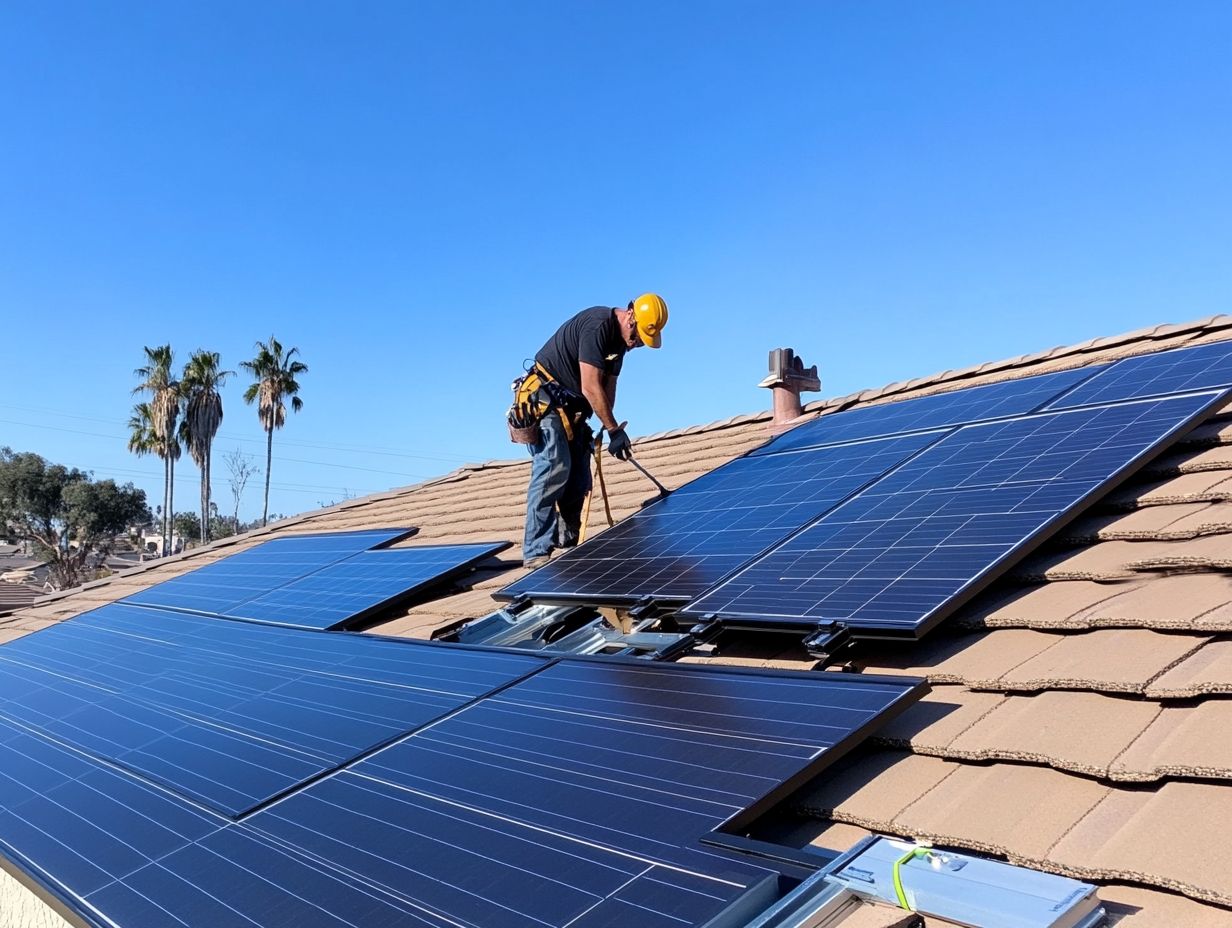
Before diving into solar installation, there are several critical factors you need to evaluate. This ensures your system will be both effective and long-lasting.
Start by examining the condition of your roof. Can it support the weight and structure of solar panels? You should also check for shadow obstructions from trees or nearby buildings, as these can seriously diminish your solar energy efficiency.
Evaluating your roof’s orientation and slope is equally important. South-facing roofs typically capture more sunlight, making them ideal candidates for solar panel placement.
Understanding local regulations and potential incentives can lead to significant financial benefits that you definitely don t want to overlook. Exploring the durability of various solar panel materials ensures long-term reliability.
Once you have covered these bases, consulting a solar expert can provide tailored advice based on your unique situation. This ensures that all critical factors align with your energy goals for optimal performance.
Preparing Your Home for Solar Installation
Get ready for solar installation with these key steps to ensure a seamless and efficient process.
- Start by securing the necessary permits from local authorities; compliance with regulations is vital for a successful solar project.
- Next, take a close look at your existing electrical setup to assess whether any upgrades are required to support the new solar system.
- This evaluation should also factor in the structural integrity of your roof, ensuring that everything is in place for your solar journey.
Steps to Take Before Installation
Before diving into solar installation, it’s essential for you to follow some key steps. This ensures you’re ready and compliant with local regulations.
First and foremost, securing all necessary permits is crucial. It helps you avoid potential setbacks during the installation process.
A thorough electrical inspection will allow you to identify needed upgrades or adjustments to your existing system. This ensures it can effectively support the new solar panels.
Obtaining these permits establishes your legal compliance and aligns with the safety standards set by local authorities, which can vary widely by region.
Once you have the appropriate paperwork, it s vital to check your electrical infrastructure. This means assessing circuit capacity and the condition of existing wiring.
Engaging certified professionals for a thorough evaluation is highly recommended. Any required upgrades should be completed before the installation begins.
Addressing these issues upfront will enhance your system’s performance and longevity. By taking these preparatory steps, you can streamline your transition to solar energy and avoid unnecessary delays and costs.
Choosing the Right Solar Company
Selecting the right solar company is a pivotal decision. This choice can greatly influence both the success of your solar installation and your overall experience.
Companies such as Eco Ease and Auswell Energy provide a range of tailored solar solutions. It is essential for you to conduct thorough research and compare your options.
Pay close attention to customer reviews, the company’s portfolio, and their expertise in electrical setups. These factors will play a significant role in ensuring a seamless installation process and maximizing the performance of your solar system.
Factors to Consider When Selecting a Solar Company
When selecting a solar company, you should weigh several factors to find the perfect match for your unique needs.
Customer reviews offer invaluable insights into the experiences of fellow homeowners. These reviews help you assess the reliability and professionalism of potential contractors.
The expertise of the company’s team in managing the entire installation process, from energy audits a review of your energy use to help save costs to electrical setup, is vital for achieving optimal system performance and longevity.
Don’t miss out on looking at the service offerings available, including maintenance packages and warranties. These can significantly impact the durability and efficiency of your investment.
A complete company should provide services that address various aspects of solar energy management. This ensures you receive support throughout the entire lifecycle of your system.
Familiarizing yourself with local regulations is key, as it influences the ease of the installation process and the financial incentives available to you.
By taking these elements into account, you can make informed decisions that align seamlessly with your energy goals.
Installation Process and Timeline
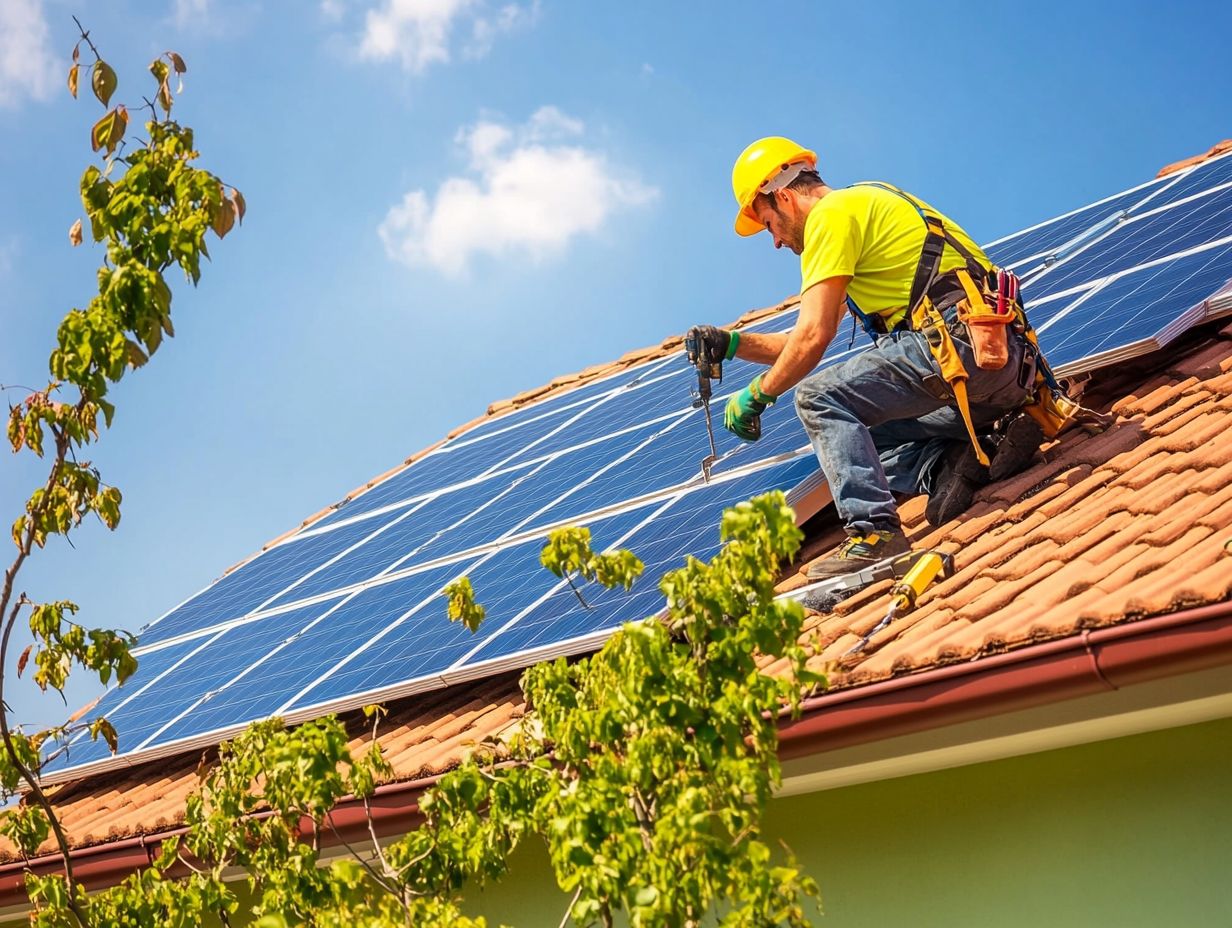
The installation process and timeline for solar energy systems can differ based on various factors. However, understanding the general steps involved can significantly aid homeowners in their preparation.
Typically, it all starts with an initial consultation and energy audit. After that, you ll need to secure the necessary permits and conduct an electrical inspection to ensure your existing system can support the new components.
Once you ve checked off these steps, the actual installation of the solar system can take anywhere from a few days to several weeks, depending on the intricacies of your specific project.
What to Expect During Installation
During the installation of solar panels, you can anticipate a well-structured series of steps designed to guarantee a successful and efficient setup.
Initially, the installation team will arrive to perform a final inspection of your roof and electrical system. They will ensure everything is primed for the solar panels. Once that’s confirmed, the actual installation process kicks off, which may take anywhere from one to three days, depending on the number of panels and the complexity of your setup.
Throughout this phase, the crew will work diligently, managing the mounting, wiring, and connection of the panels while strictly adhering to safety protocols. You might experience some interruptions, like temporary power cuts or restricted access to certain areas of your property, as the team makes necessary adjustments.
Clear communication from the installation team will keep you informed about timelines and any inconveniences. This ensures that the entire process unfolds as smoothly as possible.
Maintaining Your Solar System
Maintaining your solar system is crucial for ensuring optimal performance and longevity. This ultimately leads to sustained energy efficiency and reduced costs over time.
Prioritize regular upkeep of your solar panels think cleaning and inspections. This can prevent performance declines and help you catch potential issues before they escalate.
Start prioritizing maintenance today for the best performance of your solar system! By doing so, you re not only maximizing energy savings from your solar solutions but also ensuring you have a reliable renewable energy source at your fingertips.
In conclusion, choosing the right solar company and maintaining your system are essential for getting the most out of your solar investment. Take action today to explore your solar options and schedule a consultation!
Tips for Proper Maintenance and Care
Proper maintenance and care of your solar panels are essential for maximizing efficiency. Regular inspections help you identify any issues early, facilitating timely repairs and maintaining peak energy output.
Cleaning your solar panels is crucial. Removing dust, debris, and other obstructions significantly enhances their ability to capture sunlight and generate electricity.
Make it a habit to check your solar panel system at least twice a year, ideally during spring and fall. During these checks, look for signs of wear, loose connections, or damaged components.
Don t wait! Clean your panels every six months, especially if you live in a dusty or pollen-prone area. This routine boosts energy production and extends your system’s lifespan, allowing you to maximize your investment.
Documenting any changes or maintenance performed offers valuable insights into your system’s performance over time.
Frequently Asked Questions
Can I install solar panels on my home?
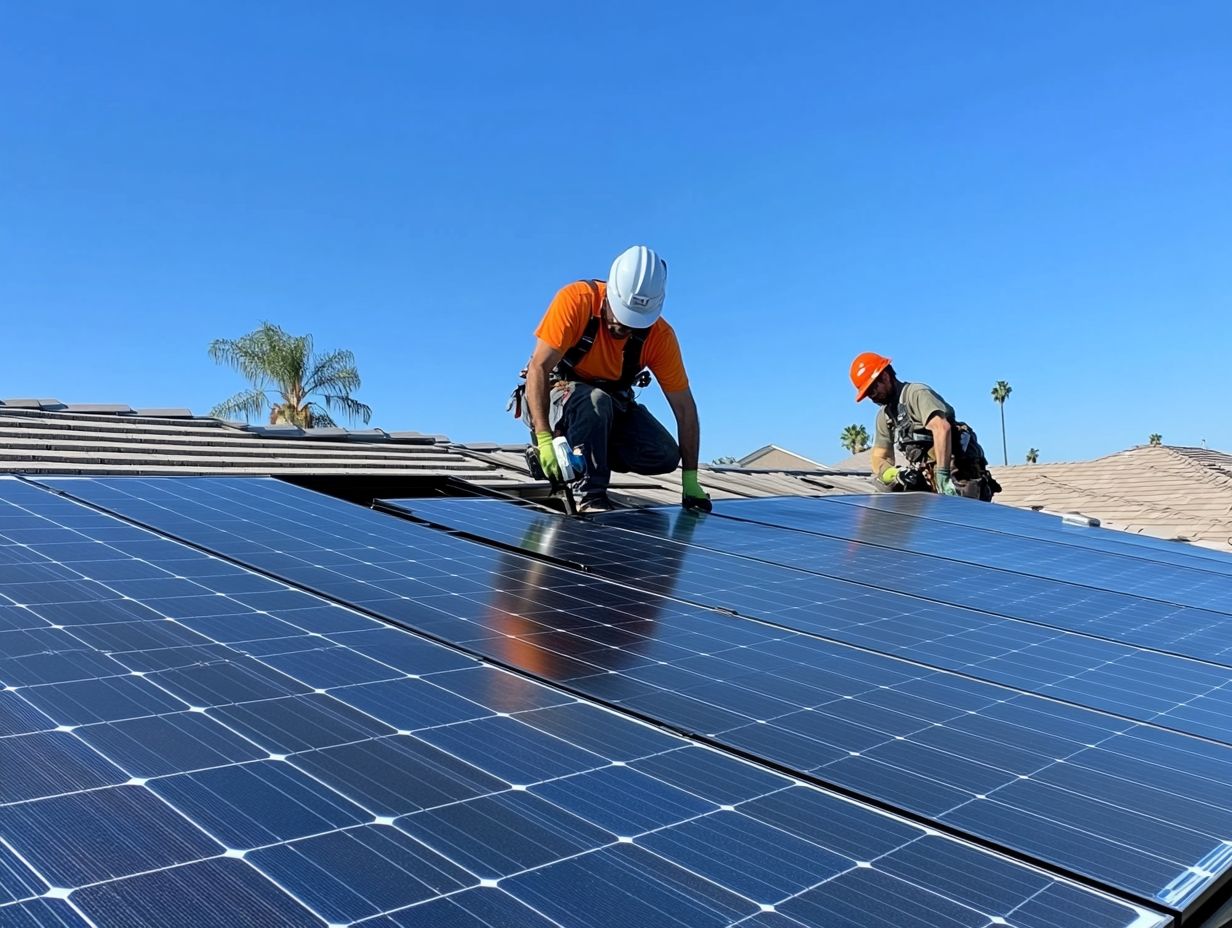
As long as you have a roof or space that receives adequate sunlight, you can install solar panels on your home. A professional should assess your roof’s condition and orientation to determine solar suitability.
Do I need to prepare my home for solar installation?
Yes, taking a few steps is important to prepare your home. Ensure your roof is in good condition, clear any obstacles blocking sunlight, and confirm that your electrical system can accommodate the new solar panels.
Do I need to obtain any permits for solar installation?
Yes, you will likely need to obtain permits from your local government before installing solar panels. These permits ensure your installation meets safety and building codes. Your solar installer can assist with the permitting process.
How long does it take to prepare my home for solar installation?
The preparation process can vary depending on your home’s condition and the complexity of the installation. On average, it can take anywhere from a few days to a few weeks. Your solar installer can provide a more accurate timeline after assessing your home.
What should I do with my trees or landscaping before solar installation?
If you have trees or landscaping that could block sunlight, consider trimming or removing them before the installation. This ensures your solar panels receive maximum sunlight and generate the most energy possible.
Do I need to be home during solar installation?
It’s not necessary for you to be home during solar installation, but it is recommended to be available in case the installation team has questions or needs access to certain areas of your home. Your solar installer will coordinate a convenient time for installation.



